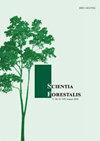Effect of soil type on wood chemical constituents and calorific values of 33-year-old Corymbia citriodora
IF 0.4
4区 农林科学
Q4 FORESTRY
引用次数: 0
Abstract
Red Latosol (LV), Red Nitosol (NV) and Quartzarenic Neosol (RQ) have different physical and chemical characteristics, as well as water holding capacity. This study aimed to determine how such differences cause changes in wood density, extractives, lignin and holocellulose contents, as well as higher heating value (HHV), lower heating value (LHV) and useful heating value (UHV), in C. citriodora wood. Wood density was lower in NV. We observed differences in chemical constituents of C. citriodora wood in all three soil types. Trees in RQ and LV soils have higher HHV, LHV and UHV values than trees in NV soil. We concluded that wood produced from all three soils is suitable for use in the Brazilian bioenergy market based on HHV values between 16500 and 18000 kJ.kg-1. Studies in the literature describe extractives and lignin as positively related, while holocellulose is negatively related to calorific value. In our study, wood density seems to have had a greater influence on calorific results than chemical constituents. It is possible that better water and nutrient availability from NV soil compared to RQ and LV soils may have led to higher tree growth, resulting in lower density and, hence, lower calorific values.土壤类型对33年生香茅木材化学成分和热值的影响
红色红土(LV)、红色硝土(NV)和石英系新土(RQ)具有不同的物理化学特征和持水量。本研究旨在确定这些差异是如何导致柑橘木材密度、提取物、木质素和纤维素含量的变化,以及高热值(HHV)、低热值(LHV)和有用热值(UHV)的变化。在三种土壤类型中,柑橘木的化学成分存在差异。RQ和LV土壤中树木的HHV、LHV和UHV值高于NV土壤中的树木。基于HHV值在16500 - 18000 kg- kg-1之间,我们得出结论,从这三种土壤中生产的木材适合在巴西生物能源市场使用。文献研究表明,提取物与木质素呈正相关,而全麦纤维素与热值呈负相关。在我们的研究中,木材密度似乎比化学成分对热学结果的影响更大。与RQ和LV土壤相比,NV土壤的水分和养分利用率可能更好,这可能导致树木生长更快,从而导致密度更低,从而降低热值。
本文章由计算机程序翻译,如有差异,请以英文原文为准。
求助全文
约1分钟内获得全文
求助全文
来源期刊

Scientia Forestalis
Agricultural and Biological Sciences-Forestry
CiteScore
1.00
自引率
0.00%
发文量
39
期刊介绍:
Scientia Forestalis is a scientific publication of the IPEF – Institute of Forest Research and Studies, founded in 1968, as a nonprofit institution, in agreement with the LCF – Department of Forest Sciences of the ESALQ – Luiz de Queiroz College of Agriculture of the USP – São Paulo University. Scientia Forestalis, affiliated to the ABEC – Brazilian Association of Scientific Publishers, publishes four issues per year of original papers related to the several fields of the Forest Sciences.
The Editorial Board is composed by the Editor, the Scientific Editors (evaluating the manuscript), and the Associated Editors (helping on the decision of acceptation or not of the manuscript, analyzed by the Peer-Reviewers.
 求助内容:
求助内容: 应助结果提醒方式:
应助结果提醒方式:


